James Rozoff's Blog, page 10
October 10, 2017
A Shared Glimpse

Have you ever, in a public place, walked past someone and have the urge, not to ignore them but to look into their eyes and smile, to acknowledge that we are all sharing a similar journey, and that life can sometimes by very beautiful?
Not seeing him or her as a potential threat or sexual conquest, not judging them or fearing being judged, but simply seeing another sentient soul, someone capable of spirituality and kindness, of love and charity, of beautiful thoughts and an openness to awe.
For that briefest of moments you are not comparing yourself to them or them to you. You do not feel jealousy for what they possess nor pity for what they do not. You feel only unity, similarity, oneness.
And though the moment is brief, it stays with you, that person stays with you. He or she is a friend to you, though you have only shared a glimpse, because they have affirmed for you your connectedness to the world beyond the physical. It has shown you that no matter your physical or economic state there is a beauty deep inside all of us more important than all other matters.
This happened to me today, at least I like to think it did. I like to think the other person involved shared in that briefest of moments the openness and goodwill I shared in a glancing smile. I do not know for sure, will never know, but I like to believe that in some small way I was capable of making someone feel what I felt. And who knows, perhaps that feeling was not born in me but was inspired by the other person. Perhaps it was something we both created together. Or perhaps it is something that is always there and we were both fortunate enough to witness it at the same moment
Of course, it could all be in my imagination. Perhaps I am a silly dreamer who imagines what does not exist. But the alternative would be to deny that such an occurrence could ever take place, to cut oneself off from being open to each day’s potential miracles and magic. I prefer my approach. And in that spirit, I hope I am able to share it with you.
Published on October 10, 2017 10:38
October 7, 2017
Madness Whispers
Madness whispers a little louder to me every day. as sanity’s offerings continue to pale. Wonder and awe or dark drudgery.
“Why not?” she speaks softly, seductively. “Why not?” And what answers I can muster come from far away as if muttered by another’s lips.
Let me be mad. Let me drift beyond the boundaries sanity has lain out for me. Sanity kills dogs and grandmothers, it hands out parking tickets and extinguishes color. It need not be.
“There is another way,” she says, her voice ripe with brightness and hope. “You can choose.”
As I drag myself to the dark dungeons of truth she holds out her hand to me and pleads, “I am yours.”
Her laughter is beguiling, the laughter of youth. She speaks of butterflies and bright blue skies while reality talks of factories and polluted seas but its voice is one of authority. Madness, madness is me.
Reality is a cage, a boundary, a prison, a resignation. It is what is left after every other option has been exhausted and extinguished. Reality is despair, it is a sad surrender. It is social security for the tired soul, the old folk’s home, a morgue for the body that awaits the grave.
Reality is a pre-arranged marriage made by my parents without my consent. Its laws were laid out by those long dead, a corpse’s hand clawing the face of the future. It is written in code to coax the mind to betray the heart.
Reality unites us in thought, but madness unites us in spirit.
“Why not?” she speaks softly, seductively. “Why not?” And what answers I can muster come from far away as if muttered by another’s lips.
Let me be mad. Let me drift beyond the boundaries sanity has lain out for me. Sanity kills dogs and grandmothers, it hands out parking tickets and extinguishes color. It need not be.
“There is another way,” she says, her voice ripe with brightness and hope. “You can choose.”
As I drag myself to the dark dungeons of truth she holds out her hand to me and pleads, “I am yours.”
Her laughter is beguiling, the laughter of youth. She speaks of butterflies and bright blue skies while reality talks of factories and polluted seas but its voice is one of authority. Madness, madness is me.
Reality is a cage, a boundary, a prison, a resignation. It is what is left after every other option has been exhausted and extinguished. Reality is despair, it is a sad surrender. It is social security for the tired soul, the old folk’s home, a morgue for the body that awaits the grave.
Reality is a pre-arranged marriage made by my parents without my consent. Its laws were laid out by those long dead, a corpse’s hand clawing the face of the future. It is written in code to coax the mind to betray the heart.
Reality unites us in thought, but madness unites us in spirit.
Published on October 07, 2017 20:07
October 2, 2017
To You, The Reviewer
(This post has some harsh points of view and probably won't win me any friends. Why post it, then? Because it needs to be said.)
When I read a review of a new book or movie or album that tells you how completely it satisfied the reviewer’s criteria, it makes me want to puke.
So you, the reviewer, wish to be satisfied on every level. You spend your money and you expect to get the utmost satisfaction in return. To you it is all a business transaction.
You know what you sound like, don’t you? You sound like someone visiting a brothel. Before the financial transaction begins, you explain to your partner for hire what it is you expect, what you want her to do, and how much you are willing to pay for the services rendered.
This is not how it works, at least when it comes to art. Now maybe you don’t want art, and that is fine. But if that is the case, don’t pretend you’re judging your experience at that level. Let’s call the transaction what it is: a greasy trade of money for titillation and satisfaction of your baser desires. Don’t try to elevate it.
Let me tell you a little something about art. I know, your college English professor taught you everything there is to know on the subject, and you never once bothered to question his intent. He led you into a cozy little room stuffed with old books with gilt covers and there he seduced you. He lured you into a world of fine ideas while slowly separating those fine and beautiful ideas from the world in which ordinary people live. In short, he showed you the world that should be while increasing the gap between that world and the world that is.
And you bought it. He showed you a world in which you were better than the money changers and the manual laborers and the small-minded businessmen. He created for you a refuge you could hide in when the real world got to be too much. You were better than that. You were apart from it.
Except you weren’t, not really. You see, there was a price to pay for this refuge from the real. You had to protect the sacred vision and so you had to do whatever was necessary in order to hide it away from the ugly world.
In other words, in order to save the lovely visions of the possibility of a better world, you had to detach it from the reality that would tear it to pieces. Like an overprotective parent who believed their child too precious for the world, you kept your precious hidden. In truth, you did not have enough faith in what you cherished to place it in the outside world, permit it to survive or wither according to its vitality and rightness.
You created a fantasy world for yourself. You took the external trappings of stories, the kind that lure children into a deeper understanding of the world, and you abandoned the deeper truths the storytellers were trying to share. And you did so because those deeper aspects of your reading would have required you to reconnect to the outside world. You would have had to commit to such ideals, put them to the test, and you were afraid to do that.
You saw the beautiful words in Hamlet but you did not see inside the heart of the man who struggled with the existential essence of his life and dilemma. You never bothered to see deep enough into the character nor the man who wrote it. You excused yourself by calling Shakespeare an unfathomable genius rather than plunging into the depths of his genius the way one who appreciated genius would. You feared where such genius would lead you, and at the same time you feared not appreciating an acknowledged classic. Sometimes your tepid little soul even sought to pass your tepid little judgment on a great work, a profound work, by adding your advice on how the work or the author or the character was lacking.
You detached yourself from the essence of all that art is, because it frightened you. It was too bright, it was too brilliant. It pushed you away from your quiet reading spot, shoved you out the front door into the big bad world you wanted no part of, just as Gandalf pushed Bilbo into adventures that were more easily read about than lived. You wanted to believe in wizards, you just didn’t want them showing up in your neck of the woods.
Art is not a sterile thing. It is not meant merely as a distraction from the real world, not some abstract but beautiful and ornate creation upon which we can for a moment ignore the uglier aspects of our lives. No, art is intimately tied to our lives. It makes us see our lives, our reality, in new ways, makes us less satisfied with what is so that we can work upon creating what should be. It is a map that can lead us to places we never would have imagined. But instead of following that map, we too often frame it and hang it upon the wall.
It is the artist’s job to make you see things from a different point of view. It is the artist’s job to make you uncomfortable. You must enter into the relationship with these expectations. It is not that the artist is above you, superior to you, it is that the artist has spent a great deal of his time and attention on a particular line of thought that he puts before you and wants you to consider. It is his job, it is the one area where he is, through endless hours of research and practice, qualified to give you his expert advice. He is no different than a doctor or a mechanic, but like them, it is his job to tell you the facts, not tell you what you want to hear and make you feel cozy.
So this is art. Maybe you’re not interested in art, maybe you think art is shit. That’s all well and good, just don’t pretend it doesn’t exist. Don’t pretend that everything that is worth writing needs to conform to your criteria. It is easy as the reviewer to believe you can criticize without being criticized in return. But reviewing is a job as well—a review, a work--and as such it is worthy of criticism itself. If you cannot or do not relate to deeper aspects of a work, you leave yourself open to criticism. It is like judging a piece of music solely on the lyrics and rhythm, ignoring the melody.
Artists aren’t here to amuse you. We have all been amused for too long. As Neil Postman said, we are amusing ourselves to death. No, it is not my job to amuse you but to awaken you, to bring you from your extended adolescence into adulthood. To lead you from amusement to amazement. This is not a bad thing. No, it is a wonderful thing. Magic is not something that exists only in the mind of a child. It exists, really exists, only to the adult mind capable of perceiving it in all its glory. It is not so frightening, you merely need to take the next step…
When I read a review of a new book or movie or album that tells you how completely it satisfied the reviewer’s criteria, it makes me want to puke.
So you, the reviewer, wish to be satisfied on every level. You spend your money and you expect to get the utmost satisfaction in return. To you it is all a business transaction.
You know what you sound like, don’t you? You sound like someone visiting a brothel. Before the financial transaction begins, you explain to your partner for hire what it is you expect, what you want her to do, and how much you are willing to pay for the services rendered.
This is not how it works, at least when it comes to art. Now maybe you don’t want art, and that is fine. But if that is the case, don’t pretend you’re judging your experience at that level. Let’s call the transaction what it is: a greasy trade of money for titillation and satisfaction of your baser desires. Don’t try to elevate it.
Let me tell you a little something about art. I know, your college English professor taught you everything there is to know on the subject, and you never once bothered to question his intent. He led you into a cozy little room stuffed with old books with gilt covers and there he seduced you. He lured you into a world of fine ideas while slowly separating those fine and beautiful ideas from the world in which ordinary people live. In short, he showed you the world that should be while increasing the gap between that world and the world that is.
And you bought it. He showed you a world in which you were better than the money changers and the manual laborers and the small-minded businessmen. He created for you a refuge you could hide in when the real world got to be too much. You were better than that. You were apart from it.
Except you weren’t, not really. You see, there was a price to pay for this refuge from the real. You had to protect the sacred vision and so you had to do whatever was necessary in order to hide it away from the ugly world.
In other words, in order to save the lovely visions of the possibility of a better world, you had to detach it from the reality that would tear it to pieces. Like an overprotective parent who believed their child too precious for the world, you kept your precious hidden. In truth, you did not have enough faith in what you cherished to place it in the outside world, permit it to survive or wither according to its vitality and rightness.
You created a fantasy world for yourself. You took the external trappings of stories, the kind that lure children into a deeper understanding of the world, and you abandoned the deeper truths the storytellers were trying to share. And you did so because those deeper aspects of your reading would have required you to reconnect to the outside world. You would have had to commit to such ideals, put them to the test, and you were afraid to do that.
You saw the beautiful words in Hamlet but you did not see inside the heart of the man who struggled with the existential essence of his life and dilemma. You never bothered to see deep enough into the character nor the man who wrote it. You excused yourself by calling Shakespeare an unfathomable genius rather than plunging into the depths of his genius the way one who appreciated genius would. You feared where such genius would lead you, and at the same time you feared not appreciating an acknowledged classic. Sometimes your tepid little soul even sought to pass your tepid little judgment on a great work, a profound work, by adding your advice on how the work or the author or the character was lacking.
You detached yourself from the essence of all that art is, because it frightened you. It was too bright, it was too brilliant. It pushed you away from your quiet reading spot, shoved you out the front door into the big bad world you wanted no part of, just as Gandalf pushed Bilbo into adventures that were more easily read about than lived. You wanted to believe in wizards, you just didn’t want them showing up in your neck of the woods.
Art is not a sterile thing. It is not meant merely as a distraction from the real world, not some abstract but beautiful and ornate creation upon which we can for a moment ignore the uglier aspects of our lives. No, art is intimately tied to our lives. It makes us see our lives, our reality, in new ways, makes us less satisfied with what is so that we can work upon creating what should be. It is a map that can lead us to places we never would have imagined. But instead of following that map, we too often frame it and hang it upon the wall.
It is the artist’s job to make you see things from a different point of view. It is the artist’s job to make you uncomfortable. You must enter into the relationship with these expectations. It is not that the artist is above you, superior to you, it is that the artist has spent a great deal of his time and attention on a particular line of thought that he puts before you and wants you to consider. It is his job, it is the one area where he is, through endless hours of research and practice, qualified to give you his expert advice. He is no different than a doctor or a mechanic, but like them, it is his job to tell you the facts, not tell you what you want to hear and make you feel cozy.
So this is art. Maybe you’re not interested in art, maybe you think art is shit. That’s all well and good, just don’t pretend it doesn’t exist. Don’t pretend that everything that is worth writing needs to conform to your criteria. It is easy as the reviewer to believe you can criticize without being criticized in return. But reviewing is a job as well—a review, a work--and as such it is worthy of criticism itself. If you cannot or do not relate to deeper aspects of a work, you leave yourself open to criticism. It is like judging a piece of music solely on the lyrics and rhythm, ignoring the melody.
Artists aren’t here to amuse you. We have all been amused for too long. As Neil Postman said, we are amusing ourselves to death. No, it is not my job to amuse you but to awaken you, to bring you from your extended adolescence into adulthood. To lead you from amusement to amazement. This is not a bad thing. No, it is a wonderful thing. Magic is not something that exists only in the mind of a child. It exists, really exists, only to the adult mind capable of perceiving it in all its glory. It is not so frightening, you merely need to take the next step…
Published on October 02, 2017 22:01
September 27, 2017
Pictures Found While Researching My Newest Novel
I've developed the habit of looking at countless pictures in order to help me get a feel for the subject matter that goes into my novels. I think it started in Perchance To Dream, but it really became necessary when I began writing not in the present but of events that took place 100 years ago. I needed to describe an era I had never experienced, and I needed to get a feel for it. I also read a considerable amount and watched movies that were both from and about the time, but that is beyond the scope of this post.
My point is, the search for images leads to interesting discoveries. I thought I'd share some of the more unusual ones with you. They are not only oddities, but they might also give you an insight into the book I'm writing (no name, as of yet).
Here is a painting of Mary and Jesus. Gaze at it for a moment, and let me know what you think:

Yes, the blonde-haired Jesus is a little odd, but not too much so considering Europe's bias in favor of a European Jesus. But the artist of this particular one is Adolph Hitler. As I don't consider myself a student of art, I'm unable to give an intelligent opinion of the work, but I'd appreciate any comments.
The rise of Hitler was a gradual one, having its roots in the first World War. Germany was a defeated nation, a people that had spilled the young men onto the battlefield only to have them returned old in spirit and infirm in body. Postwar Germany, like other nations, had to adapt to millions of men who were bearing the scars of war. Below are shown the many attachments available to those who lost a hand or hands in the war. Not pictured are the spoon and fork attachments that helped amputees in the simple task of eating.
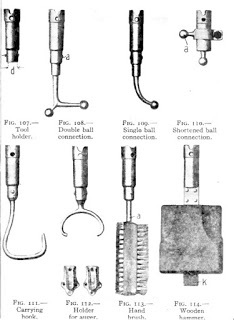
The reparations demanded by England and France for their losses in the war were more than Germany could cope with. Desperate to continue to make payments while keeping their economy afloat, The Weimar Republic did what so many others have done: they printed more money, devaluing their currency in order to delay for a time dealing what were impossible demands. What began as an unwise response quickly spiraled into an insane situation, as inflation hit the Germans in a way it never has anywhere before or since.
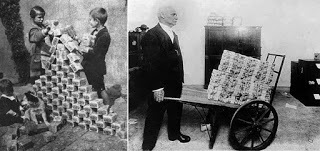
Money became so useless people used it as wallpaper and even fuel for the fire. Rather than saving, people rushed to spend their money as soon as they were paid before it became useless. Seeing no future, people began to live for the moment. They spent their money on cocaine and drinks at strip bars. People who had saved their whole lives found they had nothing, while those who spent recklessly discovered their debts easily forgiven. \
Hitler believed that since he was a symbol to the German nation, that he was married to the German nation, and thus never married his longtime love interest, Eva Braun. She was always kept in the background, never mentioned and only incidentally photographed. This photograph being a rather unusual exception. Here we see Eva Braun in black face. Given the extreme racial policies of the time, this seems almost a harmless bit of fun by comparison. Yes, it expresses ignorance, but it does not demonstrate the willful hatred her beloved showed for virtually every ethnicity that was not Germanic. It was more an imitation of what Al Jolson and others in America were doing.
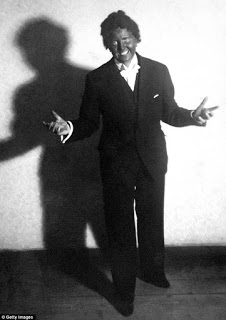
Here's the Eva Braun who caught Hitler's eye: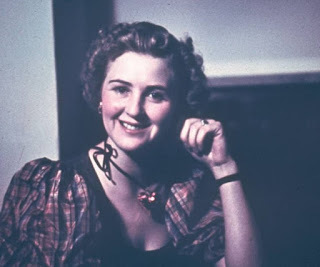
Hitler eventually did marry Eva Braun, but not until their very last day alive. Hiding in their bunker, the Soviets bombarding Berlin, Eva Braun and Adolph Hitler were married underground, only to commit suicide a short time after.
Nothing says Christmas so much as eggnog, sharing presents, and swastikas. When the Nazis came to power, everything was co-opted. Everything needed to reflect the ideals of the Third Reich. Nothing was sacred except the party and its leader:
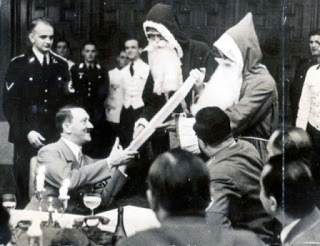
A couple of propaganda posters, basically saying that Jews and communists will destroy the world if you do not support Hitler's fight against them. Yes, it's propaganda and evil propaganda at that, but you can see how it could be effective.
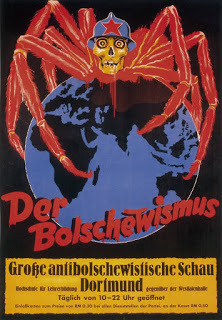
Just want to give some idea of the size of the rallies that took place during the Nazi era. It must have felt wonderful to be part of a crowd so large and so uniform. Deep within all of us is a desire to belong to something larger. This is actually a very beautiful thing, but it unfortunately can be manipulated into becoming a very bad thing.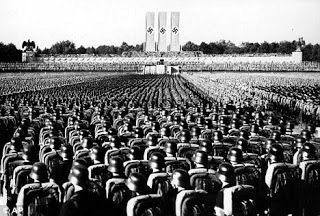

My point is, the search for images leads to interesting discoveries. I thought I'd share some of the more unusual ones with you. They are not only oddities, but they might also give you an insight into the book I'm writing (no name, as of yet).
Here is a painting of Mary and Jesus. Gaze at it for a moment, and let me know what you think:

Yes, the blonde-haired Jesus is a little odd, but not too much so considering Europe's bias in favor of a European Jesus. But the artist of this particular one is Adolph Hitler. As I don't consider myself a student of art, I'm unable to give an intelligent opinion of the work, but I'd appreciate any comments.
The rise of Hitler was a gradual one, having its roots in the first World War. Germany was a defeated nation, a people that had spilled the young men onto the battlefield only to have them returned old in spirit and infirm in body. Postwar Germany, like other nations, had to adapt to millions of men who were bearing the scars of war. Below are shown the many attachments available to those who lost a hand or hands in the war. Not pictured are the spoon and fork attachments that helped amputees in the simple task of eating.

The reparations demanded by England and France for their losses in the war were more than Germany could cope with. Desperate to continue to make payments while keeping their economy afloat, The Weimar Republic did what so many others have done: they printed more money, devaluing their currency in order to delay for a time dealing what were impossible demands. What began as an unwise response quickly spiraled into an insane situation, as inflation hit the Germans in a way it never has anywhere before or since.

Money became so useless people used it as wallpaper and even fuel for the fire. Rather than saving, people rushed to spend their money as soon as they were paid before it became useless. Seeing no future, people began to live for the moment. They spent their money on cocaine and drinks at strip bars. People who had saved their whole lives found they had nothing, while those who spent recklessly discovered their debts easily forgiven. \

Hitler believed that since he was a symbol to the German nation, that he was married to the German nation, and thus never married his longtime love interest, Eva Braun. She was always kept in the background, never mentioned and only incidentally photographed. This photograph being a rather unusual exception. Here we see Eva Braun in black face. Given the extreme racial policies of the time, this seems almost a harmless bit of fun by comparison. Yes, it expresses ignorance, but it does not demonstrate the willful hatred her beloved showed for virtually every ethnicity that was not Germanic. It was more an imitation of what Al Jolson and others in America were doing.

Here's the Eva Braun who caught Hitler's eye:

Hitler eventually did marry Eva Braun, but not until their very last day alive. Hiding in their bunker, the Soviets bombarding Berlin, Eva Braun and Adolph Hitler were married underground, only to commit suicide a short time after.
Nothing says Christmas so much as eggnog, sharing presents, and swastikas. When the Nazis came to power, everything was co-opted. Everything needed to reflect the ideals of the Third Reich. Nothing was sacred except the party and its leader:

A couple of propaganda posters, basically saying that Jews and communists will destroy the world if you do not support Hitler's fight against them. Yes, it's propaganda and evil propaganda at that, but you can see how it could be effective.


Just want to give some idea of the size of the rallies that took place during the Nazi era. It must have felt wonderful to be part of a crowd so large and so uniform. Deep within all of us is a desire to belong to something larger. This is actually a very beautiful thing, but it unfortunately can be manipulated into becoming a very bad thing.


Published on September 27, 2017 23:05
September 22, 2017
Random Thoughts, Part 25
Another set of truth missiles aimed at the heart of preconceived notions and complacency. Little tablets that, once ingested, will open your mind to new perspectives...and a few attempts at humor.
My problem as a writer is that—whenever I meet someone for the first time—I immediately invent for them a personality and background that are invariably more interesting than the ones they possess. And confirming this character to be uninteresting after a few minutes of conversation, I decide that they are unnecessary to my story and begin devising ways to kill them off.
If the flag you raise is one of defeatism and negativity, only a morbid few will rally to it, and they will never accomplish anything.
It is society that gets to decide who is the blasphemer and who is the prophet. But it doesn’t matter, because they stone them both.
A library is a sacred place where the voices of the ancients can still be heard if we but give them the required silence.
A prophet is merely someone who rises beyond the warring factions of his day and proclaims a pox on both houses. He sees beyond the narrow framework within which the opposing factions tear at each other like rats in too small a cage. He sees what must be done while those who claim to be leaders see only the struggle for power.
When we find that the only answer rationality and the intellect can provide is death, then the only option is to open ourselves to spirituality. The precise job of the intellect is to define reality, and in defining, it limits what it defines. Reality is winnowed away until the spirit is lost, until possibilities unforeseen are lost. It is necessary from time to time for the individual to transcend the intellectual world he has fashioned, rediscover with the eyes of a child what he no longer sees with wise ones. A society too becomes trapped in its perceptions.
The goal is not to change minds but awaken them, not to make people believe but question. For in questioning, they shall find their own path to truth.
Our memories of the fields we played in and the house we lived in in our youth seem so large. And yet when we visit them when we are older they seem so small, not at all as we remember them. So too does the future seem. It appears to the child as a field so large we could never hope to traverse it all, but the adult slowly begins to see the fences appear on the horizon, until at last the old man sees only the smallest of gardens.
If war created peace, wouldn’t we have it by now?
It is impossible to be in 2 places at the same time, but by fixating on where you think you should be or want to be, to the point where you do not live in the moment, it is possible to be in 0 places at once.
Be careful what you call progress. Be certain before you call something inevitable. So much that is bad for us is accepted by us because of those two words.
Calling something inevitable is just another way of calling yourself powerless.
People strain too hard to see miracles, set the conditions under which they will accept the reality of a miracle too high. Miracles are all around us, they are daily occurrences. Miracles occur with every new sunrise and in every speck of life, no matter how small. If we cannot see the miracle of life, of living, we have lost the very reason to go on living.
If you are a smoker, just remember every time you inhale you are choosing smoke over oxygen.
Ask yourself what technological advance you most hope to see and then ask yourself what technological advance you most fear. Does your hope outweigh your fear?
If ever it was a good idea to hold up those who create much as heroes to be admired it is no longer the case. Perhaps a century or more ago, when scarcity existed, those who converted nature into product had their use to society. Today we must learn to hold up he who consumes little as the model to be emulated.
The secret of life is to live joyfully an existence which requires the utmost seriousness and provides us with death and hopelessness as the ultimate end.
Happiness is an elusive prey one can pursue but never possess. While it is a criminal act for someone to step in between you and your pursuit of happiness, it is a greater crime to expect another person to be responsible for your own happiness.
My problem as a writer is that—whenever I meet someone for the first time—I immediately invent for them a personality and background that are invariably more interesting than the ones they possess. And confirming this character to be uninteresting after a few minutes of conversation, I decide that they are unnecessary to my story and begin devising ways to kill them off.
If the flag you raise is one of defeatism and negativity, only a morbid few will rally to it, and they will never accomplish anything.
It is society that gets to decide who is the blasphemer and who is the prophet. But it doesn’t matter, because they stone them both.
A library is a sacred place where the voices of the ancients can still be heard if we but give them the required silence.
A prophet is merely someone who rises beyond the warring factions of his day and proclaims a pox on both houses. He sees beyond the narrow framework within which the opposing factions tear at each other like rats in too small a cage. He sees what must be done while those who claim to be leaders see only the struggle for power.
When we find that the only answer rationality and the intellect can provide is death, then the only option is to open ourselves to spirituality. The precise job of the intellect is to define reality, and in defining, it limits what it defines. Reality is winnowed away until the spirit is lost, until possibilities unforeseen are lost. It is necessary from time to time for the individual to transcend the intellectual world he has fashioned, rediscover with the eyes of a child what he no longer sees with wise ones. A society too becomes trapped in its perceptions.
The goal is not to change minds but awaken them, not to make people believe but question. For in questioning, they shall find their own path to truth.
Our memories of the fields we played in and the house we lived in in our youth seem so large. And yet when we visit them when we are older they seem so small, not at all as we remember them. So too does the future seem. It appears to the child as a field so large we could never hope to traverse it all, but the adult slowly begins to see the fences appear on the horizon, until at last the old man sees only the smallest of gardens.
If war created peace, wouldn’t we have it by now?
It is impossible to be in 2 places at the same time, but by fixating on where you think you should be or want to be, to the point where you do not live in the moment, it is possible to be in 0 places at once.
Be careful what you call progress. Be certain before you call something inevitable. So much that is bad for us is accepted by us because of those two words.
Calling something inevitable is just another way of calling yourself powerless.
People strain too hard to see miracles, set the conditions under which they will accept the reality of a miracle too high. Miracles are all around us, they are daily occurrences. Miracles occur with every new sunrise and in every speck of life, no matter how small. If we cannot see the miracle of life, of living, we have lost the very reason to go on living.
If you are a smoker, just remember every time you inhale you are choosing smoke over oxygen.
Ask yourself what technological advance you most hope to see and then ask yourself what technological advance you most fear. Does your hope outweigh your fear?
If ever it was a good idea to hold up those who create much as heroes to be admired it is no longer the case. Perhaps a century or more ago, when scarcity existed, those who converted nature into product had their use to society. Today we must learn to hold up he who consumes little as the model to be emulated.
The secret of life is to live joyfully an existence which requires the utmost seriousness and provides us with death and hopelessness as the ultimate end.
Happiness is an elusive prey one can pursue but never possess. While it is a criminal act for someone to step in between you and your pursuit of happiness, it is a greater crime to expect another person to be responsible for your own happiness.
Published on September 22, 2017 10:31
September 12, 2017
The Road I Travel
A Drive To Work
(If you are a writer, you write about anything you experience.)
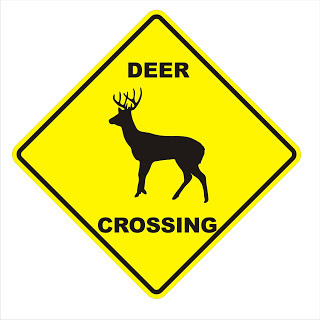
I now drive 40 minutes to get to work every day. As an environmentally inclined person, I feel bad about that, but I do need to make the house payments. And despite the fact it takes a bite out of my day, I enjoy the ride. It’s through rural areas, and a good stretch of it is along Lake Michigan.
What I notice most is the number of dead animals lying on the road: deer, racoons, skunks, opossums. Once, society took the time to remove the bodies from the road, but now we leave them there. We no longer have the resources available to do such things, no longer have the political will to do much of anything. Everything that is done is done through the market now, and the market doesn’t care about animals, dead or alive.
Perhaps it was only ever a matter of cosmetics anyway. Perhaps we were just lying to ourselves about how a technologically advanced society treats the natural world. We didn’t want to know what our need for speed was doing to the rest of God’s creatures, or the planet, so we hid the evidence. And now that we have come so far, we no longer care. We’ve grown used to it, like the factory farm I drive by that smells of animal waste, where semi-trucks daily haul out milk in shiny metallic tanks to be packaged in little cardboard containers imprinted with pictures of cows in a pasture.
A veneer of trees obscures much of the crops that grow behind them. Once I imagined vast forests lay beyond, now I know they are mere barrier walls for crops of corn to feed the cows to feed the people.
I reach the lake and soon I am driving past the closed nuclear power plant. Within its depths somewhere, God knows what is stored in God knows what kind of containers. There is no plan to deal with the radioactive waste, and so they sit and will gradually become forgotten about. It is part of our mental makeup to forget about things, no matter how important and dire they may be, if we don’t have a good way of dealing with them.
Not far past the mostly-abandoned nuclear station, I see several signs on people’s property warning about the health risks of wind turbines. I am incapable of understanding the degree of disconnect required to not notice the irony.
Working nights, I drive home in darkness. It seems I have encountered thunderstorms almost nightly this summer. I can never remember a summer so full of thunder. One becomes aware of such things when one has a skittish dog and a long drive at night.
I’ve become aware of the weather of late. It almost seems that nature itself has become unnatural. In late August, I noticed the moon was just a tiny sliver, but that sliver was more red than I ever remember seeing it. A harvest moon, I know, but still it seemed an omen to me. Perhaps it is just me. I know it is foolish to look for signs in the sky. And yet, the desire to do so is deeply imbedded in our species. Perhaps, like animals who can sense impending natural disasters, human beings too are capable sensing danger without being able to understand why.
Nightly I drive home and encounter the wildlife that must contend with traffic while crossing the road. I see a chipmunk speed across, a frog taking large jumps to cross as quickly as possible. I see a deer peering at me from a ditch, a couple of raccoons who, once committed, seem unable to turn back even with my car speeding right into their path. I brake and the disaster is narrowly averted.
My eyes are wide open, my mind alert. I do not want to hit anything, not even a frog. And yet there is something within me urging me to go faster. I need to get home, back to my life I’ve had to abandon in order to do my job to earn money to afford my car payments, car insurance, and gasoline. There is a subliminal urge too great for my conscious mind to control, and my foot applies a little more pressure to the gas pedal. Time is precious. I’ve calculated that driving even 5 miles an hour less should be sufficient to prevent an accident should something jump out in front of me, but somehow every time I look at the speedometer, I’m going faster again. Have to race my coworkers, have to beat them home, win the race.
What is wrong with me? Why do I love nature and yet not only drive so far to work, but drive so quickly from it? It is technology, it enables me to do what objectively I would never wish to do. It is like being home with a box of Twinkies: I would never imagine gorging myself sick on unnatural food, would certainly not go out of my way to do so. Ah, but if it is already there… If bad behavior is effortless and satisfying in the short term, it makes it far more difficult to do the right thing. If all it takes is pushing my foot a little harder on a gas petal, why not go faster? If gas is so damn cheap that I suffer little by polluting the atmosphere and endangering God’s little creations, it does make it more difficult to do the right thing. I do want to do the right thing.
The answer is to fashion a world in which it is easier to make good decisions. We’ve done a poor job of that. We’ve made a world where advertisement is constantly telling you to buy what you do not need, consume what is not good for you, trust in the system advertisers perpetuate. We are told that progress is our only good, and that progress means continually pushing further down on the accelerator.
We are, each one of us, driving down the road at too great a speed, heedless of the damage we cause to the natural world we ultimately rely upon for our survival. We must be reminded again and again that not only are we in control of the gas pedal, but we also have a brake.
(If you are a writer, you write about anything you experience.)

I now drive 40 minutes to get to work every day. As an environmentally inclined person, I feel bad about that, but I do need to make the house payments. And despite the fact it takes a bite out of my day, I enjoy the ride. It’s through rural areas, and a good stretch of it is along Lake Michigan.
What I notice most is the number of dead animals lying on the road: deer, racoons, skunks, opossums. Once, society took the time to remove the bodies from the road, but now we leave them there. We no longer have the resources available to do such things, no longer have the political will to do much of anything. Everything that is done is done through the market now, and the market doesn’t care about animals, dead or alive.
Perhaps it was only ever a matter of cosmetics anyway. Perhaps we were just lying to ourselves about how a technologically advanced society treats the natural world. We didn’t want to know what our need for speed was doing to the rest of God’s creatures, or the planet, so we hid the evidence. And now that we have come so far, we no longer care. We’ve grown used to it, like the factory farm I drive by that smells of animal waste, where semi-trucks daily haul out milk in shiny metallic tanks to be packaged in little cardboard containers imprinted with pictures of cows in a pasture.
A veneer of trees obscures much of the crops that grow behind them. Once I imagined vast forests lay beyond, now I know they are mere barrier walls for crops of corn to feed the cows to feed the people.
I reach the lake and soon I am driving past the closed nuclear power plant. Within its depths somewhere, God knows what is stored in God knows what kind of containers. There is no plan to deal with the radioactive waste, and so they sit and will gradually become forgotten about. It is part of our mental makeup to forget about things, no matter how important and dire they may be, if we don’t have a good way of dealing with them.
Not far past the mostly-abandoned nuclear station, I see several signs on people’s property warning about the health risks of wind turbines. I am incapable of understanding the degree of disconnect required to not notice the irony.
Working nights, I drive home in darkness. It seems I have encountered thunderstorms almost nightly this summer. I can never remember a summer so full of thunder. One becomes aware of such things when one has a skittish dog and a long drive at night.
I’ve become aware of the weather of late. It almost seems that nature itself has become unnatural. In late August, I noticed the moon was just a tiny sliver, but that sliver was more red than I ever remember seeing it. A harvest moon, I know, but still it seemed an omen to me. Perhaps it is just me. I know it is foolish to look for signs in the sky. And yet, the desire to do so is deeply imbedded in our species. Perhaps, like animals who can sense impending natural disasters, human beings too are capable sensing danger without being able to understand why.
Nightly I drive home and encounter the wildlife that must contend with traffic while crossing the road. I see a chipmunk speed across, a frog taking large jumps to cross as quickly as possible. I see a deer peering at me from a ditch, a couple of raccoons who, once committed, seem unable to turn back even with my car speeding right into their path. I brake and the disaster is narrowly averted.
My eyes are wide open, my mind alert. I do not want to hit anything, not even a frog. And yet there is something within me urging me to go faster. I need to get home, back to my life I’ve had to abandon in order to do my job to earn money to afford my car payments, car insurance, and gasoline. There is a subliminal urge too great for my conscious mind to control, and my foot applies a little more pressure to the gas pedal. Time is precious. I’ve calculated that driving even 5 miles an hour less should be sufficient to prevent an accident should something jump out in front of me, but somehow every time I look at the speedometer, I’m going faster again. Have to race my coworkers, have to beat them home, win the race.
What is wrong with me? Why do I love nature and yet not only drive so far to work, but drive so quickly from it? It is technology, it enables me to do what objectively I would never wish to do. It is like being home with a box of Twinkies: I would never imagine gorging myself sick on unnatural food, would certainly not go out of my way to do so. Ah, but if it is already there… If bad behavior is effortless and satisfying in the short term, it makes it far more difficult to do the right thing. If all it takes is pushing my foot a little harder on a gas petal, why not go faster? If gas is so damn cheap that I suffer little by polluting the atmosphere and endangering God’s little creations, it does make it more difficult to do the right thing. I do want to do the right thing.
The answer is to fashion a world in which it is easier to make good decisions. We’ve done a poor job of that. We’ve made a world where advertisement is constantly telling you to buy what you do not need, consume what is not good for you, trust in the system advertisers perpetuate. We are told that progress is our only good, and that progress means continually pushing further down on the accelerator.
We are, each one of us, driving down the road at too great a speed, heedless of the damage we cause to the natural world we ultimately rely upon for our survival. We must be reminded again and again that not only are we in control of the gas pedal, but we also have a brake.
Published on September 12, 2017 09:15
September 10, 2017
Len Wein: Elegy For A Storyteller
I just learned of Len Wein’s passing today, and feel the need to say a few words regarding how much he has contributed to comics and to my childhood and my desire to become a writer.
The youngest of five children, I was always surrounded by the comic books my older brothers would buy. They were one of the coolest things a young child could be immersed in, and I leafed through them long before I was able to read them.
I handled them carefully. My older siblings permitted me to look at them, but only after making sure I would be careful with them. Comics by their nature are rather fragile things, prone to ripping or creasing or water stains left from drinking cups left on top of them. So from my youth, I was taught a reverence for comic books that most kids my age never knew.
And at the age of six, it was time to buy my very first comic. On vacation, I walked a couple of blocks with my older brother to the local mom and pop store and had a look at the wonderfully over-stuffed comic book rack. I still remember the smell of them, blended with the aroma of assorted candies, popcorn, and bubble gum. Despite all the bright comics and recognized heroes on the covers, somehow my eyes were attracted to a comic with a large dark-green creature on the front. A muck-encrusted man-shaped monster, emerging from swampy waters.
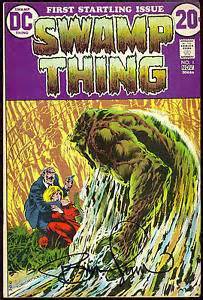
I brought it home carefully, read it oh so reverently. At the age of six I could not have been able to read it all myself, and yet a comic book writer tells his story as much in pictures as he does in words. Besides, I had my older brother who read it along with me and was able to explain anything I did not understand. A legend, for me, was born. Another sympathetic creature the world did not understand, not unlike Frankenstein or many others any horror fan of the era would know. The monster who was not really a monster, who was actually more human than most of the people he encountered.
I followed the series as much as a child of my age and means permitted. I even went as far as to cut the cover off of issue #3 to hang up on my wall. But as for the first issue, I kept in as good a shape as could be expected of someone my age, always treated it as my most prized possession.
As I said before, most kids my age didn’t treat comics as carefully as I did. But if someone had a comic I wanted, I was willing to make a trade for it, even if it was not in top condition. Such was the case with Justice League Of America #101, written by Len Wein. To this day, the name Bob is on my copy of this amazing comic, the name of my best-friend’s brother. Again, the cover attracted my attention, but the story within was what so entranced me.
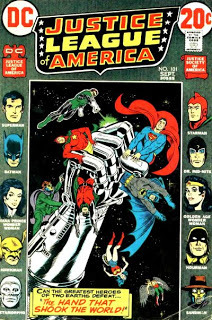
I had been familiar with the two separate teams of heroes, the Justice League of America and the Justice Society of America, had seen them team up to handle a crisis or two. But Justice League #101 had them searching for a third group of heroes, one whose very existence had been wiped from the memories of everyone. Second in a three issue story, this comic nevertheless became a favorite of mine. For years I sought out the rest of the story, which I eventually found in a $1 digest. It did not disappoint.
Flash forward to 1980, when I was 14. I was already reading Dostoyevsky and Hawthorne, but I still had a soft spot for comics. When I came upon the miniseries The Untold Legend Of The Batman, I already sensed it would be a classic. To this day it is still the definitive Batman story for me. It was written, of course, by Len Wein.
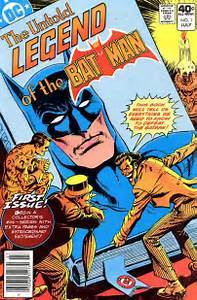
Wein later did some excellent work on one of my favorite comics, Green Lantern. He also turned to editorial duties when the Swamp Thing comic was resurrected to correspond with the dreadful movie of the same name. The comics were much better, beginning with very solid work by Martin Pasko, and then brought to an unbelievable level with the introduction of Alan Moore as writer.
And speaking of Alan Moore, Len Wein was there again as editor when Moore wrote the groundbreaking, seminal milestone that was Watchmen. It was an instant and widely recognized classic not just in comics but in fiction in general (I still prefer his work on Swamp Thing, but perhaps it is because I am so fond of the comic Len Wein created).
Lastly, at least as far I was concerned, Len Wein acted as editor of yet another of my favorite comics, All Star Squadron. As happened in my cherished Justice League #101, I was introduced to an entire cast of characters from the Golden Age of comics of which I’d been completely unaware. The past had come alive again, the deepest of archeological digs had taken place in order to have history’s mysteries retrieved. Generations had been bridged, and once again I had Len Wein, in part, to thank for it.
And this was just some of the work he did for DC Comics! There is a whole other story to be written about the work he did for Marvel Comics, but I’ll let someone who grew up reading those to tell you about them. I’ll just mention one name: Wolverine.
While I at some point outgrew reading comics (at least for a time), they—and most notably Len Wein—were at the foundation of my reading experiences, and you never outgrow your foundations. The vast panoramas he created, characters both sympathetic and inspirational, stories that gripped you on multiple levels, these will always loom large in the basement of my soul, the place where comic books are stored to be read on rainy afternoons. Heroism, justice, a sense of mystery and imagination, these were all things that were given to me by a man I was never fortunate enough to meet. I hope in some small way, Mr. Wein, my writing can give to others what you have given to me.
The youngest of five children, I was always surrounded by the comic books my older brothers would buy. They were one of the coolest things a young child could be immersed in, and I leafed through them long before I was able to read them.
I handled them carefully. My older siblings permitted me to look at them, but only after making sure I would be careful with them. Comics by their nature are rather fragile things, prone to ripping or creasing or water stains left from drinking cups left on top of them. So from my youth, I was taught a reverence for comic books that most kids my age never knew.
And at the age of six, it was time to buy my very first comic. On vacation, I walked a couple of blocks with my older brother to the local mom and pop store and had a look at the wonderfully over-stuffed comic book rack. I still remember the smell of them, blended with the aroma of assorted candies, popcorn, and bubble gum. Despite all the bright comics and recognized heroes on the covers, somehow my eyes were attracted to a comic with a large dark-green creature on the front. A muck-encrusted man-shaped monster, emerging from swampy waters.

I brought it home carefully, read it oh so reverently. At the age of six I could not have been able to read it all myself, and yet a comic book writer tells his story as much in pictures as he does in words. Besides, I had my older brother who read it along with me and was able to explain anything I did not understand. A legend, for me, was born. Another sympathetic creature the world did not understand, not unlike Frankenstein or many others any horror fan of the era would know. The monster who was not really a monster, who was actually more human than most of the people he encountered.
I followed the series as much as a child of my age and means permitted. I even went as far as to cut the cover off of issue #3 to hang up on my wall. But as for the first issue, I kept in as good a shape as could be expected of someone my age, always treated it as my most prized possession.
As I said before, most kids my age didn’t treat comics as carefully as I did. But if someone had a comic I wanted, I was willing to make a trade for it, even if it was not in top condition. Such was the case with Justice League Of America #101, written by Len Wein. To this day, the name Bob is on my copy of this amazing comic, the name of my best-friend’s brother. Again, the cover attracted my attention, but the story within was what so entranced me.

I had been familiar with the two separate teams of heroes, the Justice League of America and the Justice Society of America, had seen them team up to handle a crisis or two. But Justice League #101 had them searching for a third group of heroes, one whose very existence had been wiped from the memories of everyone. Second in a three issue story, this comic nevertheless became a favorite of mine. For years I sought out the rest of the story, which I eventually found in a $1 digest. It did not disappoint.
Flash forward to 1980, when I was 14. I was already reading Dostoyevsky and Hawthorne, but I still had a soft spot for comics. When I came upon the miniseries The Untold Legend Of The Batman, I already sensed it would be a classic. To this day it is still the definitive Batman story for me. It was written, of course, by Len Wein.

Wein later did some excellent work on one of my favorite comics, Green Lantern. He also turned to editorial duties when the Swamp Thing comic was resurrected to correspond with the dreadful movie of the same name. The comics were much better, beginning with very solid work by Martin Pasko, and then brought to an unbelievable level with the introduction of Alan Moore as writer.
And speaking of Alan Moore, Len Wein was there again as editor when Moore wrote the groundbreaking, seminal milestone that was Watchmen. It was an instant and widely recognized classic not just in comics but in fiction in general (I still prefer his work on Swamp Thing, but perhaps it is because I am so fond of the comic Len Wein created).
Lastly, at least as far I was concerned, Len Wein acted as editor of yet another of my favorite comics, All Star Squadron. As happened in my cherished Justice League #101, I was introduced to an entire cast of characters from the Golden Age of comics of which I’d been completely unaware. The past had come alive again, the deepest of archeological digs had taken place in order to have history’s mysteries retrieved. Generations had been bridged, and once again I had Len Wein, in part, to thank for it.
And this was just some of the work he did for DC Comics! There is a whole other story to be written about the work he did for Marvel Comics, but I’ll let someone who grew up reading those to tell you about them. I’ll just mention one name: Wolverine.
While I at some point outgrew reading comics (at least for a time), they—and most notably Len Wein—were at the foundation of my reading experiences, and you never outgrow your foundations. The vast panoramas he created, characters both sympathetic and inspirational, stories that gripped you on multiple levels, these will always loom large in the basement of my soul, the place where comic books are stored to be read on rainy afternoons. Heroism, justice, a sense of mystery and imagination, these were all things that were given to me by a man I was never fortunate enough to meet. I hope in some small way, Mr. Wein, my writing can give to others what you have given to me.
Published on September 10, 2017 20:16
August 28, 2017
A Weekend In Door County
I thought I'd do a little picture blog to share with you our most recent weekend getaway to Door County. It's a trip we've taken often, sometimes as a day trip, other times for a whole week. This in no way represents all that one can see or do, it is merely what we chose to do on this 2-day stay.
Before reaching Door County, we stopped in Kewaunee, where we explored Kewaunee Marshlands Walk, located right off of Highway 42. Kewaunee, although in its own county, has always seemed like the beginning of Door County for my wife and I.
Kewaunee Marshlands Our first contact with another species
Our first contact with another species
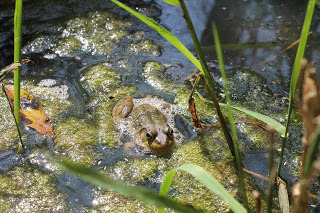
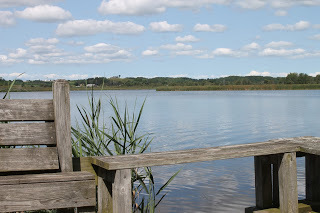 My wife has an eagle eye for birds
My wife has an eagle eye for birds
 A collection of cormorants. Is that the right term?
A collection of cormorants. Is that the right term?
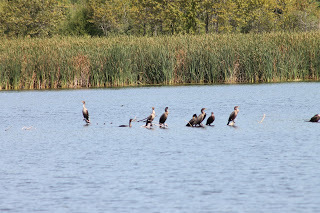 Right next door to the entrance to the marshes was an antique store, so of course we had to stop in. I was impressed not only with the collection of oddities they had but also by the prices, which were overall quite reasonable.
Right next door to the entrance to the marshes was an antique store, so of course we had to stop in. I was impressed not only with the collection of oddities they had but also by the prices, which were overall quite reasonable.
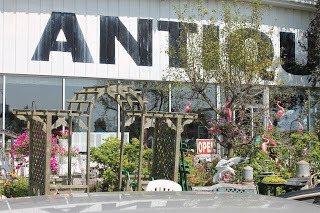 A random indoor picture
A random indoor picture
 A guitar that had accompanied The Rolling Stones on tour in 1965.
A guitar that had accompanied The Rolling Stones on tour in 1965.
 Moving on to Algoma, the true beginning of Door County. Here's a shot of the beach.
Moving on to Algoma, the true beginning of Door County. Here's a shot of the beach.
 Here is Von Stiehl winery. Located right next door is Ahnapee Brewery. My wife went left, I went right.
Here is Von Stiehl winery. Located right next door is Ahnapee Brewery. My wife went left, I went right.
 We met up out back, where we sat at the lake's edge and enjoyed our drinks. Ahnapee and Von Stiehl both have their own outdoor seating available.
We met up out back, where we sat at the lake's edge and enjoyed our drinks. Ahnapee and Von Stiehl both have their own outdoor seating available.
 A view from Von Stiehl's backyard into Ahnapee Brewery's backyard:
A view from Von Stiehl's backyard into Ahnapee Brewery's backyard:
 Next stop was Sturgeon Bay, where my wife always demands we stop and visit the scrapbooking store.
Next stop was Sturgeon Bay, where my wife always demands we stop and visit the scrapbooking store.
 We asked the owner of the store where we could get a good burger at a decent price and she turned us onto the Red Room, which was exactly what we were looking for. If you go, order the fried cheese curds.
We asked the owner of the store where we could get a good burger at a decent price and she turned us onto the Red Room, which was exactly what we were looking for. If you go, order the fried cheese curds.
Ordinarily, we don't have to ask where to go for a good burger in Door County. It's always been our ritual to stop in Egg Harbor and eat lunch there, along with a beer brewed in-house at the Shipwrecked Brewery. But this happened recently:
 The Shipwrecked Brewery has vowed to rebuild, and we vow to be among the first to visit when they re-open.
The Shipwrecked Brewery has vowed to rebuild, and we vow to be among the first to visit when they re-open.
Here is a picture of the harbor in Egg Harbor: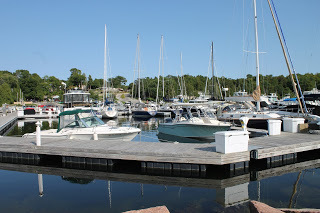
A few years back, we first stumbled upon The Ridges Sanctuary near Bailey's Harbor quite by accident. After visiting the beach we decided to take a walk through the woods. This time we took a guided tour, which taught us something about the ridges and swales that help to make the area's ecosystem unique. The gradual recession of Lake Michigan's waterline has left a series of high strips of land separated by lower, marshier area.
Here was our first glimpse of wildlife at The Ridges Sanctuary: The Carnivorous pitcher plant:
The Carnivorous pitcher plant:
 One of two light houses that were essential to the history of The Ridges Sanctuary:
One of two light houses that were essential to the history of The Ridges Sanctuary:
 The other:
The other:
 A swale between two ridges. This one seemed not so obviously marshy, but I wouldn't venture to try walking through it:
A swale between two ridges. This one seemed not so obviously marshy, but I wouldn't venture to try walking through it:
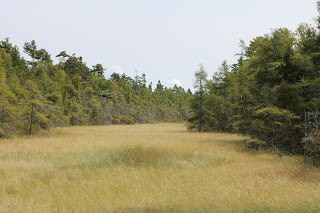 No pileated woodpeckers were seen, but here is indisputable evidence of their presence:
No pileated woodpeckers were seen, but here is indisputable evidence of their presence:
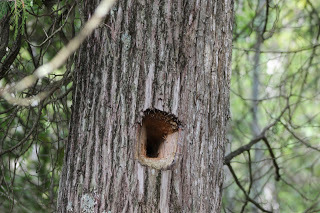 A random shot of The Ridges:
A random shot of The Ridges:
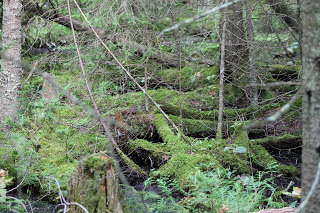 There are three frogs sitting on top the lily pads, though two of them are worthy of a Where's Waldo picture:
There are three frogs sitting on top the lily pads, though two of them are worthy of a Where's Waldo picture:
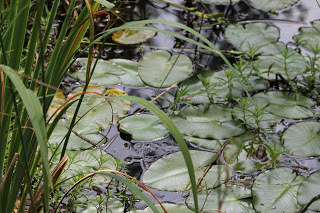 Yet another swale:
Yet another swale:
 A snowy egret quite comfortable with having his picture taken:
A snowy egret quite comfortable with having his picture taken:
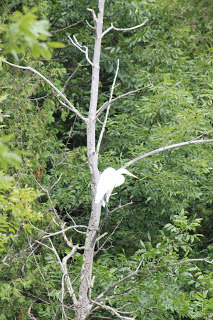
After a couple of hours' walk through nature, it was only fitting that we stopped in Beer Zot in Sister Bay where my wife kindly took over driving duties so I could have a couple fine Belgian Beers. For you beer snobs out there, I had a Triporteur Full Moon 12 in a bottle and a Gulden Draak on tap. One does not find such fine beer at your typical bar, nor does one attempt to drive after imbibing such potent brew.
After a walk along the bay and a compulsory visit to Door County Creamery, it was on to Ephraim where we were fortunate enough to catch the sled dogs before they departed the Door County Sled Dog Education Center/Museum. I've seen the dogs twice now and both times it was while they were on the bus. I can't help thinking of them as rock stars on tour, since that is the way they are treated by their handlers as well as their admirers. Whenever animals and humans are forced to interact, I am always worried that the animals might be taken advantage of, but in this case I'm relatively certain that this is a love-fest for all involved. These are rescued animals acting as willing envoys on behalf of people looking to rescue still more animals. Their lives are good ones.
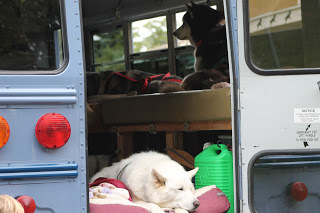 A short distance from where the dogs stay. You should be so lucky:
A short distance from where the dogs stay. You should be so lucky:
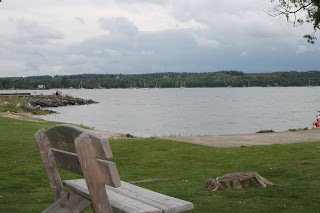 Another picture from Ephraim. Not sure if the restaurant is dog friendly, but many in Door County are:
Another picture from Ephraim. Not sure if the restaurant is dog friendly, but many in Door County are:
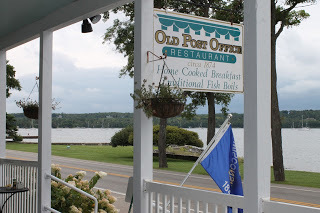 Lastly, a few pictures from Fish Creek, which was where we stayed. I've long considered Fish Creek to be the heart of Door County.
Lastly, a few pictures from Fish Creek, which was where we stayed. I've long considered Fish Creek to be the heart of Door County.
Touch Of The World. If Fish Creek is the heart of Door County, Touch Of The World is the heart of Fish Creek. Here, Door County simply explodes in bizarre and beautiful expressions of summer, of joy, of life. While there are certainly people with a good deal of money who come to Door County, it doesn't cost a penny to walk around the shops. And there are curiosities to be found for anyone, regardless of their price range.
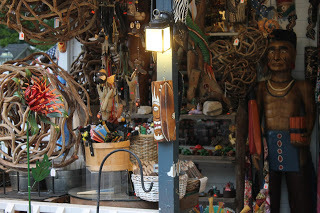 Some of the many shops that can be found off the beaten paths in Fish Creak. The donut doesn't actually sing, but that doesn't lessen the surreal atmosphere that exists here:
Some of the many shops that can be found off the beaten paths in Fish Creak. The donut doesn't actually sing, but that doesn't lessen the surreal atmosphere that exists here:

As for the evening, there was plenty to choose from. The Indigo Girls were playing in Fish Creek, along with a lot of local bands. There is a Drive-In theater nearby which we previously went to, as well as the Peninsula Players Theater which we also knew from experience to be a good time. But I saw a poster for a play called Blue Material, which appeared to be written by a local. Sometimes I just get this sense that something is worth experiencing, although there seems to be no compelling reason to believe so. I had that feeling with this play, and so I urged my wife to give her Friday evening over to something that could possibly be a bust.
When I saw the modest size of the theater, I almost turned around:
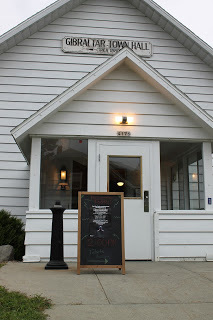
When I entered the Gibraltar Town Hall and saw a mere 20 or so folding chairs, I asked myself what the hell I had gotten myself into. But then I remembered the times I had seen amazing performances by musicians and other artists, and I realized that the size of the audience seldom equates to the quality of the artists. So we sat ourselves down to a play written by an unknown, performed by a cast who didn't have the courage to set an actual price for viewers. Oh, plus we got free coffee and bakery from Fika Bakery and Cafe.
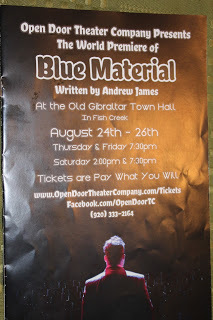
My sense for the obscure but wonderful has never really failed me. The play I watched was truly impressive on all levels (save spectacle. There were no helicopters exploding on stage or performers flying through the air.) Acting was very good, dialog was crisply written and delivered, there was both humor and depth to the story, and the dialog flowed smoothly between the play itself and the play within a play, namely Chekov's Uncle Vanya. If there was one performer I might suggest was deserving of special mention, it would be Anna Mae Beyer, if only for her excellent singing and ukulele performance.
And such was our weekend getaway to Door County. Our next visit, I'm sure, will be quite different than this one, as there are many other places to explore, though I will make a point of seeing the Open Door Theater Company again.
Before reaching Door County, we stopped in Kewaunee, where we explored Kewaunee Marshlands Walk, located right off of Highway 42. Kewaunee, although in its own county, has always seemed like the beginning of Door County for my wife and I.
Kewaunee Marshlands
 Our first contact with another species
Our first contact with another species

 My wife has an eagle eye for birds
My wife has an eagle eye for birds
 A collection of cormorants. Is that the right term?
A collection of cormorants. Is that the right term?
 Right next door to the entrance to the marshes was an antique store, so of course we had to stop in. I was impressed not only with the collection of oddities they had but also by the prices, which were overall quite reasonable.
Right next door to the entrance to the marshes was an antique store, so of course we had to stop in. I was impressed not only with the collection of oddities they had but also by the prices, which were overall quite reasonable. A random indoor picture
A random indoor picture
 A guitar that had accompanied The Rolling Stones on tour in 1965.
A guitar that had accompanied The Rolling Stones on tour in 1965.
 Moving on to Algoma, the true beginning of Door County. Here's a shot of the beach.
Moving on to Algoma, the true beginning of Door County. Here's a shot of the beach. Here is Von Stiehl winery. Located right next door is Ahnapee Brewery. My wife went left, I went right.
Here is Von Stiehl winery. Located right next door is Ahnapee Brewery. My wife went left, I went right. We met up out back, where we sat at the lake's edge and enjoyed our drinks. Ahnapee and Von Stiehl both have their own outdoor seating available.
We met up out back, where we sat at the lake's edge and enjoyed our drinks. Ahnapee and Von Stiehl both have their own outdoor seating available. A view from Von Stiehl's backyard into Ahnapee Brewery's backyard:
A view from Von Stiehl's backyard into Ahnapee Brewery's backyard:
 Next stop was Sturgeon Bay, where my wife always demands we stop and visit the scrapbooking store.
Next stop was Sturgeon Bay, where my wife always demands we stop and visit the scrapbooking store.
 We asked the owner of the store where we could get a good burger at a decent price and she turned us onto the Red Room, which was exactly what we were looking for. If you go, order the fried cheese curds.
We asked the owner of the store where we could get a good burger at a decent price and she turned us onto the Red Room, which was exactly what we were looking for. If you go, order the fried cheese curds.Ordinarily, we don't have to ask where to go for a good burger in Door County. It's always been our ritual to stop in Egg Harbor and eat lunch there, along with a beer brewed in-house at the Shipwrecked Brewery. But this happened recently:
 The Shipwrecked Brewery has vowed to rebuild, and we vow to be among the first to visit when they re-open.
The Shipwrecked Brewery has vowed to rebuild, and we vow to be among the first to visit when they re-open.Here is a picture of the harbor in Egg Harbor:

A few years back, we first stumbled upon The Ridges Sanctuary near Bailey's Harbor quite by accident. After visiting the beach we decided to take a walk through the woods. This time we took a guided tour, which taught us something about the ridges and swales that help to make the area's ecosystem unique. The gradual recession of Lake Michigan's waterline has left a series of high strips of land separated by lower, marshier area.
Here was our first glimpse of wildlife at The Ridges Sanctuary:
 The Carnivorous pitcher plant:
The Carnivorous pitcher plant:
 One of two light houses that were essential to the history of The Ridges Sanctuary:
One of two light houses that were essential to the history of The Ridges Sanctuary:
 The other:
The other:
 A swale between two ridges. This one seemed not so obviously marshy, but I wouldn't venture to try walking through it:
A swale between two ridges. This one seemed not so obviously marshy, but I wouldn't venture to try walking through it:
 No pileated woodpeckers were seen, but here is indisputable evidence of their presence:
No pileated woodpeckers were seen, but here is indisputable evidence of their presence:
 A random shot of The Ridges:
A random shot of The Ridges:
 There are three frogs sitting on top the lily pads, though two of them are worthy of a Where's Waldo picture:
There are three frogs sitting on top the lily pads, though two of them are worthy of a Where's Waldo picture:
 Yet another swale:
Yet another swale:
 A snowy egret quite comfortable with having his picture taken:
A snowy egret quite comfortable with having his picture taken:

After a couple of hours' walk through nature, it was only fitting that we stopped in Beer Zot in Sister Bay where my wife kindly took over driving duties so I could have a couple fine Belgian Beers. For you beer snobs out there, I had a Triporteur Full Moon 12 in a bottle and a Gulden Draak on tap. One does not find such fine beer at your typical bar, nor does one attempt to drive after imbibing such potent brew.
After a walk along the bay and a compulsory visit to Door County Creamery, it was on to Ephraim where we were fortunate enough to catch the sled dogs before they departed the Door County Sled Dog Education Center/Museum. I've seen the dogs twice now and both times it was while they were on the bus. I can't help thinking of them as rock stars on tour, since that is the way they are treated by their handlers as well as their admirers. Whenever animals and humans are forced to interact, I am always worried that the animals might be taken advantage of, but in this case I'm relatively certain that this is a love-fest for all involved. These are rescued animals acting as willing envoys on behalf of people looking to rescue still more animals. Their lives are good ones.
 A short distance from where the dogs stay. You should be so lucky:
A short distance from where the dogs stay. You should be so lucky:
 Another picture from Ephraim. Not sure if the restaurant is dog friendly, but many in Door County are:
Another picture from Ephraim. Not sure if the restaurant is dog friendly, but many in Door County are:
 Lastly, a few pictures from Fish Creek, which was where we stayed. I've long considered Fish Creek to be the heart of Door County.
Lastly, a few pictures from Fish Creek, which was where we stayed. I've long considered Fish Creek to be the heart of Door County.Touch Of The World. If Fish Creek is the heart of Door County, Touch Of The World is the heart of Fish Creek. Here, Door County simply explodes in bizarre and beautiful expressions of summer, of joy, of life. While there are certainly people with a good deal of money who come to Door County, it doesn't cost a penny to walk around the shops. And there are curiosities to be found for anyone, regardless of their price range.

 Some of the many shops that can be found off the beaten paths in Fish Creak. The donut doesn't actually sing, but that doesn't lessen the surreal atmosphere that exists here:
Some of the many shops that can be found off the beaten paths in Fish Creak. The donut doesn't actually sing, but that doesn't lessen the surreal atmosphere that exists here:

As for the evening, there was plenty to choose from. The Indigo Girls were playing in Fish Creek, along with a lot of local bands. There is a Drive-In theater nearby which we previously went to, as well as the Peninsula Players Theater which we also knew from experience to be a good time. But I saw a poster for a play called Blue Material, which appeared to be written by a local. Sometimes I just get this sense that something is worth experiencing, although there seems to be no compelling reason to believe so. I had that feeling with this play, and so I urged my wife to give her Friday evening over to something that could possibly be a bust.
When I saw the modest size of the theater, I almost turned around:

When I entered the Gibraltar Town Hall and saw a mere 20 or so folding chairs, I asked myself what the hell I had gotten myself into. But then I remembered the times I had seen amazing performances by musicians and other artists, and I realized that the size of the audience seldom equates to the quality of the artists. So we sat ourselves down to a play written by an unknown, performed by a cast who didn't have the courage to set an actual price for viewers. Oh, plus we got free coffee and bakery from Fika Bakery and Cafe.

My sense for the obscure but wonderful has never really failed me. The play I watched was truly impressive on all levels (save spectacle. There were no helicopters exploding on stage or performers flying through the air.) Acting was very good, dialog was crisply written and delivered, there was both humor and depth to the story, and the dialog flowed smoothly between the play itself and the play within a play, namely Chekov's Uncle Vanya. If there was one performer I might suggest was deserving of special mention, it would be Anna Mae Beyer, if only for her excellent singing and ukulele performance.
And such was our weekend getaway to Door County. Our next visit, I'm sure, will be quite different than this one, as there are many other places to explore, though I will make a point of seeing the Open Door Theater Company again.
Published on August 28, 2017 09:39
August 21, 2017
The Slow Strangling Of Our Consciousness
Asking the experts of today to solve the world’s problems is like asking the priests of the volcano god how to end the drought. All they will tell you to do is sacrifice a virgin, it’s all they know. Today’s experts are little different, there are just more of them. Ask them what their solutions are, and they will tell you to bomb it, privatize it or medicate it.
Everyone in a position of power in a corrupt system is de facto corrupt himself. In bowing to a corrupt authority, they have surrendered their conscience, have proven themselves unable to choose between right and wrong. They cannot save us, they can only hurt us. We must help ourselves, there is no other power we can turn to.
Those in power, those whose job it is to inform the public, are more herders of opinion than people interested in expanding our understanding of the circumstances we now face. Their job is to limit the view of those who must toil for the present system in the same way horses are blinkered to prevent them being distracted from the task demanded of them.
And in blinkering others, they blinker themselves. Intent on their task, they are so focused on it that they lose sight of their larger obligation to humanity. Not constricted themselves, they yet become even more myopic than those they blinker because, as it is said, none are so blind as those who refuse to see.
An object in motion tends to stay in motion. A rock rolling downhill not only continues to roll downhill, it picks up speed as it does. Media that is more concerned with directing thought than it is opening new paradigms and providing greater context for its viewers will not merely maintain the status quo but will continue to narrow the window through which the world is shown. This has been occurring for decades now, though it has happened just slowly enough that we somehow have not become aware of it. The imperfections of the human mind are many, and the study of how those imperfections can be exploited has been well funded. Kind and decent human beings can be manipulated into supporting the most inhuman of systems if they are led to believe that the “experts” know more than they. Research the Milgram experiments if you have any doubt.
There are two ways thought can travel: outward and inward. We can expand our understanding of the world we live in by permitting ourselves to hold more than one possibility, one paradigm at a time. By not demanding hard and simplistic answers we can drift off into seeing facts and events from multiple perspectives. This requires a degree of faith, a relative absence of fear. In this way we can acquire a more sophisticated and nuanced understanding of the world and our place in it.
But fear is a barrier that bounces such understanding back upon ourselves. The media has erected a curtain of fear that causes us to seek simple answers in order to deal with immediate threats that may or not be real. The media would have you believe that ISIS, fascists, Russia, Iran, North Korea, and people of the party opposite yours are right outside the door. The crisis is perpetual, though ever-shifting, and in such a situation, you have little recourse but to trust those who have been kind enough to alert you to the threat. They have to run the media this way, it’s good for business.
Once your thoughts and perceptions begin to peer inward, once you begin to discard possibilities and embrace simplistic solutions, the lens through which you see the world continues to shrink. And like the teeth of a predator, the tools of the media are designed to grab hold of you and constantly direct you towards its awaiting maw. You sit transfixed, staring with fear and incomprehension at the world outside which is actually the world inside the media’s constricted narrative.
It is worth reminding yourself that the media is not your friend. What they do they do for money. There are ample examples easily found on the internet where those who are in the know admit as much. The CEO of CBS himself said of Donald Trump’s presidential run, “It might not be good for America, but it’s damn good for CBS.” Are these the sort of people you want guiding you, guiding your nation? Are these the sort of people in whose hands you want to place your emotional and spiritual well-being? The future of the planet?
They do what they do for money. They do what they do for self-enrichment. Oh, I know, the mantra of the day is that the free enterprise system that rewards individual greed ends up being the ultimate delivery system for all that is good for us. It is repeated to us constantly until we accept it uncritically, indeed unthinkingly. And who is it delivering that message to us night and day? The media, a conglomeration of corporations that not only seek profit for themselves but seek a cultural milieu that justifies such profiteering for themselves and their sponsors.
The result is ultra hi-def television that nonetheless offers us only black and white broadcasting, the contrast level turned so high that there is little to no gray area. The definition our televisions are capable of is nothing short of miraculous, and yet so little detail is ever provided. Instead, instances of violence are looped continuously and the narrative that accompanies the video must play to the beat.
In short, the media is a Frankenstein monster created by powerful corporate interests and faithfully obedient to the Military Industrial Complex, the more direct weapon of those same corporate interests. It has a job, and it is not to inform you. It has a mission statement, and it is not the search for truth. It has an obligation to someone, and it is not the viewer. Unless you truly believe you live in a free society, you must know this is true.
You do know it is true. On some level you are unable to accept the lie. In your calmer moments, those moments where the media is not busily herding ideas that have strayed too far from the official narrative the way a sheepdog herds the flock, you have admitted as much. But then the powers that be find some new unsavory business to attend to and the media is put into motion once again in order to justify some great evil, such as destroying the environment or bombing nations that have done nothing to us. Then the fear sets in and you cling to the narrative the media spins the way Harlow’s lab monkeys clung to their cloth mothers.
It's time to step away from the artificial zone of comfort the media has constructed for us. Not only is it a trap but it is one that crushes us once we are inside it.
It will seem like madness at first, because you have been conditioned your whole life to think within the box. Those paths to death and destruction are the only ones we’ve been shown, and you’ve been corrected every time you’ve strayed too far from them. But one only has to look honestly at the ever-shrinking mindset that the authorities present to realize they offer no hope to humanity. They offer death, fear, environmental destruction. Their hope for the future is a technology bereft of all morality or humanity, Their hope is that perhaps we can export a few fortunate ones to some new planet to begin again this dysfunctional system. Hope for tomorrow is just another product or viewpoint they’re trying to sell, not a guiding principle.
We’re on our own. Humanity must evolve or perish. The system that exists today, the one all the authorities and institutions promote in order to advance themselves, is a death cult hell-bent on wasting Earth’s precious resources to make weapons in order to blow up more of Earth’s precious resources. Where are the voices in government, in business, or the media that decry the insanity? They are not merely silent, they are loudly crying for more.
Everyone in a position of power in a corrupt system is de facto corrupt himself. In bowing to a corrupt authority, they have surrendered their conscience, have proven themselves unable to choose between right and wrong. They cannot save us, they can only hurt us. We must help ourselves, there is no other power we can turn to.
Those in power, those whose job it is to inform the public, are more herders of opinion than people interested in expanding our understanding of the circumstances we now face. Their job is to limit the view of those who must toil for the present system in the same way horses are blinkered to prevent them being distracted from the task demanded of them.
And in blinkering others, they blinker themselves. Intent on their task, they are so focused on it that they lose sight of their larger obligation to humanity. Not constricted themselves, they yet become even more myopic than those they blinker because, as it is said, none are so blind as those who refuse to see.
An object in motion tends to stay in motion. A rock rolling downhill not only continues to roll downhill, it picks up speed as it does. Media that is more concerned with directing thought than it is opening new paradigms and providing greater context for its viewers will not merely maintain the status quo but will continue to narrow the window through which the world is shown. This has been occurring for decades now, though it has happened just slowly enough that we somehow have not become aware of it. The imperfections of the human mind are many, and the study of how those imperfections can be exploited has been well funded. Kind and decent human beings can be manipulated into supporting the most inhuman of systems if they are led to believe that the “experts” know more than they. Research the Milgram experiments if you have any doubt.
There are two ways thought can travel: outward and inward. We can expand our understanding of the world we live in by permitting ourselves to hold more than one possibility, one paradigm at a time. By not demanding hard and simplistic answers we can drift off into seeing facts and events from multiple perspectives. This requires a degree of faith, a relative absence of fear. In this way we can acquire a more sophisticated and nuanced understanding of the world and our place in it.
But fear is a barrier that bounces such understanding back upon ourselves. The media has erected a curtain of fear that causes us to seek simple answers in order to deal with immediate threats that may or not be real. The media would have you believe that ISIS, fascists, Russia, Iran, North Korea, and people of the party opposite yours are right outside the door. The crisis is perpetual, though ever-shifting, and in such a situation, you have little recourse but to trust those who have been kind enough to alert you to the threat. They have to run the media this way, it’s good for business.
Once your thoughts and perceptions begin to peer inward, once you begin to discard possibilities and embrace simplistic solutions, the lens through which you see the world continues to shrink. And like the teeth of a predator, the tools of the media are designed to grab hold of you and constantly direct you towards its awaiting maw. You sit transfixed, staring with fear and incomprehension at the world outside which is actually the world inside the media’s constricted narrative.
It is worth reminding yourself that the media is not your friend. What they do they do for money. There are ample examples easily found on the internet where those who are in the know admit as much. The CEO of CBS himself said of Donald Trump’s presidential run, “It might not be good for America, but it’s damn good for CBS.” Are these the sort of people you want guiding you, guiding your nation? Are these the sort of people in whose hands you want to place your emotional and spiritual well-being? The future of the planet?
They do what they do for money. They do what they do for self-enrichment. Oh, I know, the mantra of the day is that the free enterprise system that rewards individual greed ends up being the ultimate delivery system for all that is good for us. It is repeated to us constantly until we accept it uncritically, indeed unthinkingly. And who is it delivering that message to us night and day? The media, a conglomeration of corporations that not only seek profit for themselves but seek a cultural milieu that justifies such profiteering for themselves and their sponsors.
The result is ultra hi-def television that nonetheless offers us only black and white broadcasting, the contrast level turned so high that there is little to no gray area. The definition our televisions are capable of is nothing short of miraculous, and yet so little detail is ever provided. Instead, instances of violence are looped continuously and the narrative that accompanies the video must play to the beat.
In short, the media is a Frankenstein monster created by powerful corporate interests and faithfully obedient to the Military Industrial Complex, the more direct weapon of those same corporate interests. It has a job, and it is not to inform you. It has a mission statement, and it is not the search for truth. It has an obligation to someone, and it is not the viewer. Unless you truly believe you live in a free society, you must know this is true.
You do know it is true. On some level you are unable to accept the lie. In your calmer moments, those moments where the media is not busily herding ideas that have strayed too far from the official narrative the way a sheepdog herds the flock, you have admitted as much. But then the powers that be find some new unsavory business to attend to and the media is put into motion once again in order to justify some great evil, such as destroying the environment or bombing nations that have done nothing to us. Then the fear sets in and you cling to the narrative the media spins the way Harlow’s lab monkeys clung to their cloth mothers.
It's time to step away from the artificial zone of comfort the media has constructed for us. Not only is it a trap but it is one that crushes us once we are inside it.
It will seem like madness at first, because you have been conditioned your whole life to think within the box. Those paths to death and destruction are the only ones we’ve been shown, and you’ve been corrected every time you’ve strayed too far from them. But one only has to look honestly at the ever-shrinking mindset that the authorities present to realize they offer no hope to humanity. They offer death, fear, environmental destruction. Their hope for the future is a technology bereft of all morality or humanity, Their hope is that perhaps we can export a few fortunate ones to some new planet to begin again this dysfunctional system. Hope for tomorrow is just another product or viewpoint they’re trying to sell, not a guiding principle.
We’re on our own. Humanity must evolve or perish. The system that exists today, the one all the authorities and institutions promote in order to advance themselves, is a death cult hell-bent on wasting Earth’s precious resources to make weapons in order to blow up more of Earth’s precious resources. Where are the voices in government, in business, or the media that decry the insanity? They are not merely silent, they are loudly crying for more.
Published on August 21, 2017 09:26
July 24, 2017
Bring The Sixties Back

My earliest memories seem to be of music, and that music was from the sixties. By the time I was 4 years old it was already 1970, but what had happened in the 60’s had been imprinted hard upon my psyche, though being of such a young age I had no way of knowing that. The Beatles, The Animals, Cream, Jimi Hendrix, and countless others had been the music I was immersed in as a child. Psychedelia was in my DNA.
My earliest memories were of war. Not of war as most experienced it, a psychologically scarring experience that changed people’s lives, never for the better. No, I experienced war broadcast to our living room every night. My experience with war was not a visceral one but rather presented to me as a moral dilemma: was it right or wrong? People used to ask such questions back then.
I was a bastard child of the 60’s, too young to be considered legitimate and yet bearing all the distinguishing characteristics. Having four siblings, all at least 8 years older than myself, I considered myself a legacy Aquarian. I was only four, but I knew who Syd Barret was. I had not done LSD, but experienced much of the art that had been influenced by it.
Most of all, I breathed in the winds of change that had been blowing since the doctor forced my first inhalation. Things had changed a hell of a lot in the years surrounding my birth. At home, people were becoming aware of the need for preserving the environment, were confronting racial, sexual, and societal injustices that had so long been imbedded in our society that they were not even mentioned in the mass culture. Fortunately, a sub-culture had sprung up to shine a light on what was going on beyond the bright chrome, neon lights, and Howdy Doody Puppetry that so often blinded us from the subtler aspects of our society.
Elsewhere, far from American shores, people were rising up and sloughing off the yokes of imperialism and colonization and white rule. We were no longer a white planet. The 1960’s led us to the concept that the world was not a world of white actors with a few persons of color strewn about the stage for variety but an actual melting pot and quilt where people of all colors and races could add something new to the world vision.
The world view freaking exploded! A fourth if not a fifth and sixth dimension was added to our way of seeing things. When we saw ourselves we no longer saw merely through the eyes of a white male but of an African American, an Indian, a Hispanic. The possibilities were endless. They were endless doubled, because we could also see through the eyes of women, women of every background, race, and creed. Sure, there had always been the feminine point of view, but it was something foreign, an other, an alternative to the prism we stared through. Now we could look through the eyes of women, now that gap was not merely bridgeable but was insisting to be crossed. Women spoke for women, demanded to be seen for who they were, demanded to be understood, demanded to have a part in defining the group reality.
I was perhaps among the first of American children to grow up on heroes who were not exclusively Caucasian. Bruce Lee, Roberto Clemente, Mohammed Ali, these were the people I wanted to be like when I grew up. Somehow race was downplayed in those days. Everyone had outrageously big, frizzy hair and dressed in bright colorful clothes and skin color seemed to be less of a distinction: everything faded into hippie.But what I had been born into—or more importantly, what my earliest initial memories were about—was the furthest representation of an already spent force. I do not remember a time where Robert or John Kennedy walked the earth. Malcom and Martin too were gone. The great peaceful gathering that was Woodstock had been and gone and was followed by the violence of Altamont. The Beatles had broken up, and while we still had a few decent years of pop music left to us, the change was coming.
Like I said, I was never part of the 60’s but grew up in its wake. The revolution that so many seemed to anticipate had been diverted, but the appearance of progress had to be maintained for a while yet lest the truth be too unpalatable. The great movement for equality and power to the people was slowly subverted and distracted until what was left was hollowed out and perverted remnants of what once was. Feminism became concerned about women wanting to smash glass ceilings and forgot about those who had to mop their floors. Equality of the races became identity politics, driving us apart rather than allowing us to come together. Capitalism became the magic bullet for helping people out of poverty, pretending to empower people, giving them freedom from limiters without providing the freedom to actually succeed.
And war became an acceptable means towards achieving whatever ends we thought were worthwhile. That was the great betrayal, that violence in both word and deed should become a vehicle for change.
Even more than change, the 60’s were about peace. No American represented this notion of peace better than Martin Luthor King Jr., whose campaign for justice through non-violent means rivalled and echoed Mahatma Gandhi’s struggles in India and South Africa.
Peace was important enough to merit a logo AND a hand gesture. Peace was part of the holy trinity, a triune aspect of god co-existing with love and understanding. Peace was a perspective, a commitment, a path forward from the problems that threatened our planet. People actually protested for peace. People actually wrote songs that preached peace. They were the first generation to grow up in a world that might be utterly destroyed by war, who were taught to cower under their school desks, whose parents built bomb shelters. They knew viscerally that violence was not the answer they were looking for.
But like I said, the movement that very naturally came about was very unnaturally co-opted by those who artfully spin the narratives that big money pays them to spin. A generation that was clued into the importance of peace were subtly led down other paths. Mainly we were sold the idea that such a movement was impractical, impossible, or simply naïve. And gradually the narrative about Martin Luthor King became that he was a man who protested for the rights of blacks and nothing more. As if his life was not a remarkable example of the power of peace, the triumph of “soul power” and agape over violence and hatred. As if the gift he gave was to African Americans alone and not every man, woman and child on this planet.
We need another peace movement in this nation. We need to dust off the one that was abandoned sometime in the early 70’s and wave that banner bravely once more. We are a different culture nowadays, no longer naïve but perhaps we are somehow better able to understand the situation we now face. Perhaps—and it may require a degree of faith, hubris, and commitment to optimism—perhaps we are more uniquely suited towards a more sustained pursuit of the path that leads us to where we need to go. Because there is little doubt of where we need to go. All indicators point to the fact that we are worse off than we were when we first diverged from the path of peace.
Whatever changes we wish to see, to make, in this world, will come about only by walking the path of peace, only by a very real and determined commitment to peace. Perhaps those in the ‘60’s—and I’m referring to the average person and not those such as Martin Luthor King, who knew the depths of commitment it took—had a rather naïve view of peace, a shallow faith that did not survive the hardships they encountered.But if you call the peace movement of the sixties naïve, I call the lack of one today delusional and chilling. Nuclear war is even more possible today than it was then, the belligerence of nations greater, the structures that were erected between humanity and annihilation left to rust. Peace is never going to happen unless we make it happen. No government will ever create peace, it is up to the citizens to demand it.
Whatever other change we wish to see in the world will flow from that. To work for peace is to find commonality with one another. It is seeing ourselves as part of the world, not in combat with it. It is love not hate, it is the realization that we have to find an alternative to conflict. It is a very clear choice: are we going to commit to the path that leads to a peaceful future or are we going to stray from it whenever it is convenient and self-serving to do so? At some point we have to realize that convenience and self-interest are our enemies. Fear and doubt, too, we must admit to be working against our overall odds of surviving as a species.
It is not as difficult a choice as fear, selfishness, and doubt make it out to be. These are the voices of the child within us that fears to take the steps necessary to reach adulthood. We once believed that the sixties were a time of naivete, now we can see they were the first tentative steps taken by a young species learning how to walk, how to stand on its own without the prop of violence. It is time to take the step forward towards a peaceful future. The steps will be unsteady, like a child’s, but we must take them or else wallow our short lives in infantile fantasies about how the comfort of the world we’ve known up to now can continue to provide us safety.
Published on July 24, 2017 08:10



